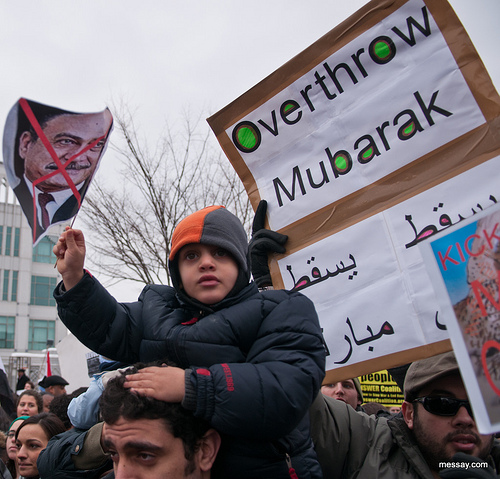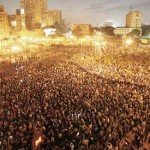
A protest in solidarity of the Egyptian uprising in front of the Egyptian embassy in Washington, D.C. (Photo: Messay.com)
The revolution sweeping over Egypt is echoing through the virtual realm, and reverberating in the form of solidarity protests across the United States.
In the last week, as they’ve watched coverage streaming on Al Jazeera’s website and read on-the-ground blog and Twitter posts that have managed to get through the Egyptian government’s blockage of Internet access and cell phones, Egyptian immigrants have appeared jubilant about the revolution turning their country upside down.
“I am really happy, I hope he (Mubarak) will leave without any more bloodshed,” said Eman Morsi, a PhD candidate at NYU in Middle Eastern studies, who attended a protest outside the United Nations in New York on Saturday.
“It took me by surprise—nobody could see it coming—but when you think about it, it’s not really shocking, it had to happen at some point, with the non-existence of a political situation where you could vent your grievances,” she told Fi2W.
Morsi, who is 26 and grew up in Cairo, said her generation had been very cynical about Mubarak’s government. “I was born with Mubarak, so it would be nice to see someone else,” she said, with a hint of sarcasm.
Over the past 30 years of Mubarak’s presidency, Morsi said, the country’s safety net has frayed, the middle class as shrunk while poverty has increased and power has become concentrated in the hands of a few.
“I’m positive that things will get better from now on—as long as real democracy happens—not just replacement of one ‘pharaoh’ with another.”
The protests in Egypt were sparked by Tunisia’s successful revolution earlier in January, and many of the themes are similar—joblessness, government corruption, police brutality, and rising food prices.
Ahmed Teleb, an Egyptian American living in Seattle, said he was cautiously optimistic. “It looks like he’s going to fall, but what will they put in place? Just another military person?”
Teleb said Mubarak has been hated by many Egyptians for a very long time. He remembered riding buses in Cairo about 20 years ago where the passengers would chant “Mubarak Hamarak!” (Mubarak, you’re a donkey!) as presidential processions marched by.
Some Egyptian Americans have been frantic over the past week as they were unable to reach their relatives and friends once Internet and cell phone service were severed by the government. But Teleb was calm, saying his mother, who lives in the U.S. but coincidentally was in Cairo when the protests began, reported she is safe, and excited about the revolution. “She and my cousin feel safe enough to be marching (Tuesday),” Teleb said.
But along with the excitement over a new, potentially more democratic political era in their homeland, some Egyptian Americans are feeling anxious about the possibility of a power vacuum in their country. No clear opposition leader has emerged, with the possible exception of Nobel laureate Mohamed ElBaradei, the former director general of the International Atomic Energy Agency. Haroon Moghul, a Pakistani American who is the executive director of the Maydan Institute, said increasingly he is hearing concern from Egyptian Americans about political paralysis. “What if Egypt can’t get out of this and see the way ahead?”
Both Moghul and Morsi cautioned against comparing this Egyptian revolution with Iran’s Islamic revolution in 1979. “It’s two completely different situations,” said Morsi, who said she was disappointed in mainstream media outlets for making that analogy.
Moghul, who recently published an article outlining how Egypt’s revolution is not Islamic, said the western press has for too long portrayed the struggle in Egypt as one of religion—Muslim Brotherhood vs. Mubarak—when there are real economic and political injustices in the society. “They are too concerned with the role of religion and not concerned with the lives of Egyptian people,” Moghul said.
Morsi predicted Mubarak’s ouster would succeed, but it would take a few weeks, particularly because the U.S. government hasn’t openly rejected the Egyptian leader, a longstanding, strategic ally in the Middle East.
One notable aspect of this uprising has been how Egyptians have harnessed social media and blogs to organize demonstrations and spread the word about what is happening in the streets, while the government has told a different story on state owned media, harassed journalists, and in a fearful move, shut down Internet Service Providers and cell phone networks.
“People are using their landlines to call international modems to get their information out,” said Deborah Ann Dilley, the Daily Digest editor at Global Voices, a project that aggregates and curates blog posts and citizen media from around the world. As it gets more difficult for Egyptians in Egypt to reach international audiences, Dilley predicted Egyptian immigrants on social networks and blogs would amplify their voices: “The diaspora is going to take on more of the role of getting out the information,” she said.




